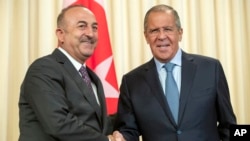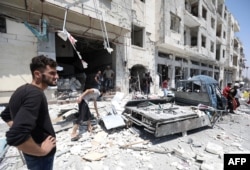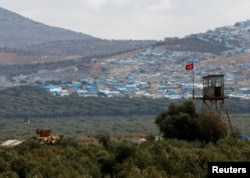Turkish Foreign Minister Mevlut Cavusoglu has warned against a possible Syrian government offensive in Syria's last rebel-held province of Idlib, saying a military solution "would be a disaster," not just for the area, but for all of Syria. Cavusoglu made his comments in Moscow as Syrian forces backed by Russia massed ahead of an expected offensive against Idlib.
"We should continue to work together to maintain the cease-fire in Syria, under the Astana Process," Cavusoglu said at a Moscow press conference with Russian counterpart Sergey Lavrov. Cavusoglu also cited the risk to the region's large civilian population, saying, "Civilians will be harmed."
Lavrov, for his part, said, "We agreed to continue our joint efforts to stabilize the situation in the region [Syria] and to create safe conditions for Syrian refugees to return home."
The Astana Process calls for Russia and Iran, the main supporters of the Syrian government, to work with Turkey, one of the chief backers of the rebels, to end Syria's civil war. Idlib is one of the so-called "de-escalation zones" created under Astana, in which rebels and their families moved to areas protected by a cease-fire; however, Syrian government forces backed by Russian airpower have overrun all the zones except for Idlib.
More than 2 million Syrians, along with an estimated 100,000 or more rebels, are holed up in Idlib, which borders Turkey. Ankara has set up 12 military observation posts as part of an agreement with Tehran and Moscow. In June, a senior Turkish presidential adviser, speaking to VOA on condition of anonymity, warned that Ankara would not allow Idlib to be overrun.
"This is a ticking bomb that needs to be taken care of, right now," said former senior Turkish diplomat Aydin Selcen, who served across the region.
Turkey is vowing to resist any military incursion. The government in Ankara fears a major humanitarian disaster, with hundreds of thousands of refugees fleeing across the border if the Syrian government captures Idlib. Analysts warn such an exodus would pose security threats, given some rebels' affiliation with the Islamic State and al-Qaida groups. Turkey currently hosts more than 3 million Syrian refugees.
Military presence
Syrian government forces are steadily building up their forces around Idlib, with helicopters reportedly dropping leaflets warning of an imminent operation.
"Once the summer heat and the Bayram [Religious Eid holiday, which ends Friday] holiday passes, I do anticipate a Syrian offensive and Assad militia to start harassing Turkey's monitoring posts in the north of the province of Idlib," said political analyst Atilla Yesilada of Global Source Partners. By Assad, he was referring to Syrian President Bashar al-Assad.
In the past few weeks, Turkish military forces have been reinforcing their military presence in Idlib, including deploying anti-aircraft missile systems. Large numbers of tanks also have been sent to the Turkish border with Idlib.
Former diplomat Selcen noted that with the strength of Turkish forces in Idlib, and the support of the local population in the province, "Idlib can be defended against Syrian armed forces and Damascus-affiliated militias, militarily speaking."
"While Ankara insists it will not allow this [Idlib operation] to happen, Moscow could be the key player," said Huseyin Bagci, professor of international relations at Ankara's Middle East Technical University.
Role of Russia
Russia controls Syrian airspace with its sophisticated S-400 anti-aircraft missile system.
"Without the Russians allowing Turkey to use Syrian airspace, Turkey could not have done the two operations it did in Syria," said international relations expert Soli Ozel of Istanbul's Kadir Has University. Turkish forces have conducted two major military operations against a Syrian Kurdish militia. Turkey now controls a broad swath of northern Syria.
Ankara's growing cooperation with Moscow in Syria has been a springboard for deepening ties between the traditional regional rivals, much to the unease of Turkey's NATO allies.
With Russia, one of the main backers of Syrian, and Ankara opposing a Syrian government attack on Idlib, analysts say Moscow faces a diplomatic conundrum. "There was always going to be a limit to Turkey's relationship with Moscow," Ozel said.
"Yes, it can put a strain on Turkish-Russian relations; that's why [Russian] President [Vladimir] Putin is working so hard diplomatically. That is why Russia is quite active to solve this diplomatically," Selcen said.
Separately, Turkey's defense and intelligence chiefs, Hulusi Akar and Hakan Fidan, also were in Moscow on Friday for discussions with senior Russian officials, including President Putin, at the Kremlin.
Observers suggest Moscow could be looking for Ankara to use its influence over the Syrian rebel forces to facilitate a peaceful handover of Idlib to Syrian government forces and avert a humanitarian crisis and exodus into Turkey.
Ankara reportedly has countered by proposing to differentiate radical and moderate rebel forces as a means to allow part of Idlib to remain under opposition control. Analysts say maintaining rebel control of a portion of Syria is a strategic necessity for Ankara.
"We can't allow Assad to reconquer all of Syria because for the very simple reason we have 3.6 million Syrians in Turkey and the Turks don't want them," analyst Yesilada said. "It's becoming a major burden for the AKP. Even AKP voters are complaining about Syrians," he said, referring to Turkey's ruling party.
"Turkey needs to hold some portion of Syria and pose a credible threat to Assad," Yesilada added, "to force Assad into a peace agreement that will accept these refugees back."






